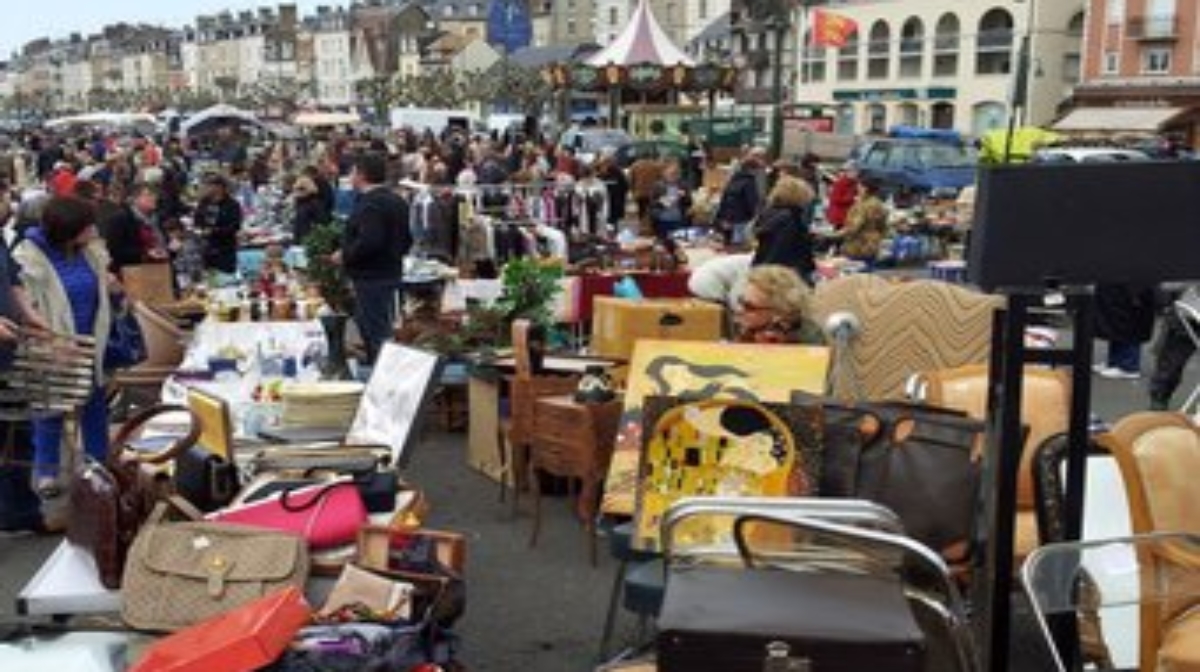It’s just une petite hop across the channel, but promises a wealth of vintage and antique finds that come with a distinctive sense of romance and timeless appeal. Vintage and antique hunting in France has never been more popular, and increasing numbers of Francophile’s are snapping up pieces with unique Gallic charm at a bargain prix.
We say a cheery “Salut!” to two experienced buyers who show us how to navigate the country’s fertile brocantes, flea markets and vide-greniers.
An American in France
Since moving from the Pacific Northwest of the USA to Basse Normandie in northern France, American writer, photographer and vintage seller, Cat Bude (below), has combined her three passions. “I opened my online vintage shop, www.SundayBrocantes.com in Spring 2011, specialising in rustic, simple and charming French vintage and antiques.”
She admits that her business is also a great excuse to explore the region’s many countryside brocantes and flea markets, while snapping pictures of her finds and writing about them in her blog. Along with her husband, Cat also creates and hosts vintage shopping tours in Paris and Normandy for vintage lovers and those in the trade.
So, why is France such a vintiquing hotspot? “French vintage style is timeless and mixes in well with all types of décor; from classic to modern and there are so many types of markets and places to find vintage items all over France at a variety of price points.”
Barrister-turned-upcycler
Brighton-based ex-barrister, Rachel Baker (right) agrees. As the owner of The Applebird House, specialists in upcycling and transforming older statement pieces for the home, she is a regular channel-hopping bargain hunter. “It’s 30 minutes through the ‘chunnel’ and a country full of the old, beautiful and unique items is yours to explore. The French love to reuse, repair and retain, so even the unlikeliest street market can reveal treasures such as antique furniture, Parisian vintage fashion and quirky glassware.”
Sounds très facile, so where are the best places to get started? Rachel advises, “A great place to start is http://www.brocabrac.fr which lists all of the markets throughout the year.” But, be warned; it’s in French, Prelovers.
She says that the brocantes (a mixture of an antique fair and carboot sale) are a national passion in France. “Villages hold them regularly during the peak March to October season. Also popular in summer are vide-gerniers where people clear out the attic of the family farmhouse revealing treasures galore.”
Vintiquing over the channel
For real bargain hunters, Cat says, “I love the summer sales known as ‘vide-grenier’ or ‘foires à tout’ which are more casual, anything goes type sales that are usually quite large. You might have to sift through lots of common items to find a treasure, but when you do the prices are outstanding.”
 She says that any weekend in July the countryside is packed with brocantes and regional outdoor sales. “You could easily visit a dozen over the weekend, all within a 10-30 minute drive.”
She says that any weekend in July the countryside is packed with brocantes and regional outdoor sales. “You could easily visit a dozen over the weekend, all within a 10-30 minute drive.”
During the ‘off season’, Cat suggests visiting the brocante ‘depots’ and warehouses. “These are normally filled from floor to ceiling with all types of vintage and antique décor pieces, furnishings, art and household items.”
With such a feast of riches, which key items does the pair keep their eyes peeled for in the hope of spotting?
“French rustic and farm-style vintage items,” says Cat. “Zinc is especially popular in watering cans, bowls and bottle racks. Simple and functional items like white porcelain serving pieces, confiture jars and all types of classic vintage linens. Buyers also appreciate well-made vintage wicker, like boulangerie and laundry baskets.”
Just returned from a recent trip, Rachel says, “I picked up vintage French posters for £8 each, and a 1940’s leather handbag for just £3. Great buys at the moment include French doorknobs and handles, enamel advertising signs, bergere chairs and wardrobes.”
However, coming across such choice items isn’t always a case of simple luck, and both treasure hunters say there’s no short cut to bagging a bargain, only hard work and dedication. And be prepared to set your alarm clock to the crack of dawn.
 How to go about it
How to go about it
“You have to arrive early at the sales for the best selection,” says, Cat. “Professional brocanteurs often come early and can clean out the really desirable items.” Similar, then, to carboot sales in the UK.
Language is another barrier that needs to be overcome, so how can buyers seal the deal if their French doesn’t run much beyond “bonjour”?
“Do attempt to speak French and be friendly even if you can’t. Always says “bonjour” at the very least, and learn a few key phrases,” advises Cat. “My top tip is to take pen and paper so that you can easily negotiate with sellers without fluent French, or without making a costly mistake!” Rachel says.
The art of haggling and diplomacy are other vital skills. Rachel says, “Haggling is expected: at the large brocantes aim for 10% less than the initial price, at the smaller fairs a 20-25% discount is usual. Just remember that a sense of fun goes a long way to get a bargain but that nothing beats an attempt at French and a big smile!” Cat says a little homework can also be helpful. “Don’t always expect to get a deal, and try to know the ‘value’ of what you want to purchase before you shop. That way you won’t embarrass yourself by haggling or possibly walking away from a great deal.”
Cash is also king at these informal markets and fairs. “Bring small bills and coins so that you are ready to negotiate and pay smoothly.”
And, armed with your Euros be prepared to pound the pavements. Rachel says, “Remember to take cash, strong bags and sensible shoes!”
Bon voyage!
Insider Secrets
 Cat says:
Cat says:
“Shop during the lunch hours (12-2) at the outdoor brocantes and flea markets. Sellers are relaxed, normally enjoying ‘une pique-nique’ and a glass or two of wine… They don’t mind being interrupted if you are a serious buyer and sometimes they are even more likely to give you a deal so they can get back to their ‘déjeuner’.
Rachel says:
“The best bargains are found at the smaller brocantes and marché aux puces (flea markets) held every weekend throughout France, and it is here that you can pick up furniture and homewares at a fraction of the UK price.”
Key Phrases
- If you want to head over the channel and haggle some great vintage and antique deals, these key phrases could help you seal the deal.
- How much is it? – C’est Combien?
- How much does it cost? – Quel est le prix?
- That’s too expensive – C’est trop cher
- Will you accept…? – Accepterez-vous…?
- Could you come down a little? – Pourriez-vous descendre un peu?
- This is my final offer – C’est ma dernière offre
- We have a deal – Nous-avons un accord
- Thankyou – Merci
- Help! – Aidez-moi!
Further information
Fancy planning a vintiquing trip to France, check out these websites for the lowdown on where to go.
- http://www.fleamarketinsiders.com/best-flea-markets-in-france/
- http://vide-greniers.org/flea-market-france.php
- http://www.theguardian.com/travel/2010/apr/28/france-best-flea-markets-shopping
(Thanks to Cat Bude for the images of French markets)

